
EU agri-food products protected by quality schemes such as geographical indications can face counterfeiting and usurpations in third countries, resulting in significant economic losses for EU producers (European Commission, 2021). The same can happen in the other direction, and with the expansion of e-commerce platforms, these market dynamics have found new avenues to occur. The reform post-2022 of the CAP’s Common Market Organisation has extended the protection of quality schemes’ intellectual property (IP) rights to e-commerce platforms. However, how will this reform be enforced to protect both EU and non-EU producers? Will it establish a level playing field that also protects non-EU quality schemes directly registered in the EU, and those included in the association agreements signed with non-EU countries?
By Melina A. Campos
1. Introduction
The rise of widespread internet connectivity corresponds with the increasing digitalisation of the agri-food system, including trade. The COVID-19 pandemic simply accelerated it. According to a report focused on food and beverage e-commerce from the Business Research Company[1] (2022), world sales of food products via e-commerce from 2021 to 2022 will increase by approximately USD 10 billion.
In view of this growing digital market at global level, the protection of agri-food quality schemes from fraudulent practices and law infringements becomes a complex matter. Some examples of quality schemes are protected geographical indications (PGI), protected designations of origin (PDO), or traditional specialties guaranteed (TSG).
According to this study by EUIPO (2016) on the infringements of geographical indications for wine, spirits, agricultural products, and foodstuffs in the EU, the value of GI infringing products in the EU was approximately € 4.3 billion in 2014, which approximately corresponds to 9.0 % of the EU GI product market.
The ultimate level of protection for these quality schemes will not only depend on the IP rights’ rules and their enforcing control mechanisms in the EU, but also by the conditions set in the association agreements with non-EU countries, and lastly, by the capacity of market actors and authorities inside and outside the EU to understand, negotiate, meet, circumvent, enforce, and appeal to these conditions.
The analysis addressed in this research for ARC2020’s CAP Strategic Plans project is divided in two parts. Firstly, this article aims to make sense of, and anticipate the extent to which the EU mix of regulations governing quality schemes, the recently agreed CAP’s Common Market Organisation regulation post-2022, and the proposal for a new Digital Services Act could establish an effective and fair legal framework to exercise a protected trade of agricultural goods holding quality schemes in a digital environment.
Secondly, the article focuses on the EU’s association agreements with third countries, specifically Chile and Georgia, to understand the extent to which they already incorporate rules that safeguard intellectual property (IP) rights in e-commerce with the EU market.
Henceforward, this policy analyses aims to answer the following questions:
- How does the CAP reform post-2022 address the protection of agri-food quality schemes products’ IP rights in e-commerce, together with other relevant EU directives?
- To what extent are EU’s association agreements with Chile and Georgia ready to regulate international e-commerce and safeguard the IP rights of agri-food quality schemes?
To answer our policy research question, we adopted a literature review and case-study approach. Firstly, we analysed EU legislation and relevant evaluation studies to explore the current functioning IP rights protection mechanisms across member states. Then, we dived into the specific realities of quality schemes already traded globally. As wine is one of the most dynamic and illuminating examples of agri-food produce traded via online platforms (see Box 1), we interviewed the respective IP rights authorities from Chile and Georgia to acquire more in-depth information on the trade specificities of this agri-food product on the e-commerce modality.
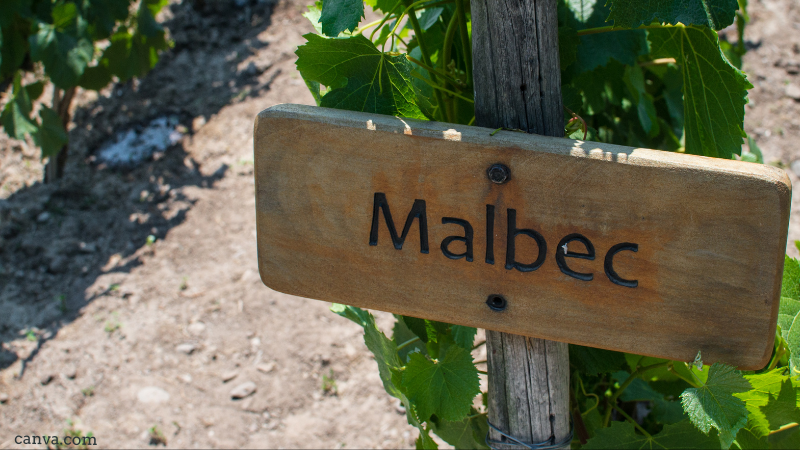
We selected these two countries because their association agreements with the EU already include chapters on the three interlinked topics: a) Geographical Indications, b) IP rights, and c) E-commerce provisions. Both IP authorities were contacted, via e-mail, a questionnaire was applied to assess their understanding of the legislation, and they were further interviewed via phone calls and Zoom meetings. They were approached between May and June 2022. Overall, the purpose was to understand how those IP authorities created a control system for enforcing IP rights for agri-food quality schemes in the frame of their respective association agreements, considering online sales channels as well.
| E-commerce platforms constitute a new tool for increasing sales and market presence for agricultural goods holding quality schemes. The “Evaluation support study on Geographical Indications and Traditional Specialities Guaranteed protected in the EU” suggests that the wine sector is the fastest-growing sector for agri-food quality schemes (European Commission, 2020). Just to mention, for the French wine sector, the report “Study on the marketing of wine on the internet”, conducted by the “Comité National des Interprofessions des Vins à appellation d’origine et à indication géographique (CNIV)” concluded that since 2017 the sales of wine online increased on average 11% per year. In 2019, French wines holding either geographical indications or protected designations sales on the internet represented 9 to 10 % of total wines sales in France. Most of the wine under quality schemes sold online in e-commerce platforms (55%), ranged between € 7,50 to € 40,00 per bottle. Another share of wine under quality schemes sold online (10%) ranged between € 90,00 and € 200,00 per bottle (France AgriMer, 2020). |
Box 1: E-commerce platforms, new sales channel. The case of the French wine
It is important to clarify that this article does not explore the issues and/or possible solutions concerning the business transactions and/or pre-conditions (connectivity, marketing, storage, inventory, distribution, investment-versus-profitability, etc.) of selling quality schemes products on an e-commerce platform, and how these can benefit or negatively affect trade operators. It only focuses on the control mechanisms for enforcing the rules protecting IP rights of agri-food quality schemes once the goods are displayed and traded on such e-platforms.
2. CAP post-2022 and protection of quality schemes’ IP rights
As part of the European Green Deal, the European Commission pledged to reform legislation to meet the ambitions of the Farm to Fork and Biodiversity strategies, in light of environmental goals such as pesticide reduction or increased organic farming, and socio-economic objectives, such as strengthening the position of farmers and producer groups along value chains within the EU and/or in foreign markets (European Commission, 2019). For supporting and raising awareness about this objective, the EU has designed a special portal that includes a Business-to-Business (B2B) platform to promote the entire EU-registered agri-food quality schemes[2] worldwide.
For instance, the Commission’s proposal to revise the EU regulation for quality schemes[3] was part of the intention to promote fairer, authentic, high-quality food markets internationally, and ultimately reinforce the position of agricultural producers and improve the rural economy (European Commission, 2022). This legislative proposal, presented in March 2022 and still under negotiation, gives prominence to the extension of IP rights protection mechanisms specifically in e-commerce. The proposal draws attention to the importance of establishing a monitoring mechanism for agri-food quality scheme IP rights on the marketplace, including the internet (Art. 32, 38, and 73).
In addition, this proposal envisages the simplification of procedures for third countries’ producer groups that decide to register quality schemes and directly make them recognisable for the Commission, and, consequently, to the whole EU single market. In this sense, it brings in more inclusive legal provisions that accommodate the interests of two types of non-EU quality schemes: i.) those registered directly by a foreign producer[4] with the EU after completing the registration at the country of origin, and ii.) those mutually recognised via association agreements with the EU.
Besides this reform proposal, the already agreed legislations for the CAP reform post-2022 extend the protection of quality schemes’ IP rights to e-commerce platforms in different amendments to the previous regulations (Box 2). Even though this extension to e-commerce is a major milestone for IP rights protection, monitoring is a second and critical implication. For monitoring IP rights of quality schemes from non-EU countries in e-commerce, we must consider several technical challenges, such as the existence of different types of quality schemes (see above). The EU Commission and the European Union Intellectual Property Office (EUIPO)[5] have conducted various assessments to understand these challenges. Figure 1 provides a glimpse of the factors to consider for enforcing the protection of agri-food quality schemes’ IP rights in e-commerce.
Key amendments of the Common Market Organization regulation (EU) No 1308/2013:
Key amendments of the regulation on quality schemes for agricultural products and foodstuffs (EU) No 1151/2012:
|
Box 2: Summary of key amendments of the CAP’s CMO Regulation 2021/2117 relevant for quality schemes protection in e-commerce
Although these CAP amendments might have an impact on the conditions to be set in future association agreements, their operationalisation depends on the enforcement mechanisms set up at member states’ level and the terms and conditions already signed in existing agreements with third countries. In other words, besides setting a broader EU framework, the impact of these CAP amendments in terms of protecting non-EU quality schemes still depends on the member states’ monitoring mechanisms (see the Italian case study in Box 3), and the level of protection/enforcement resulting from negotiations of association agreements.
| To our knowledge, Italy is the only or among the few EU Member State that has created and owns an IP rights monitoring system for protecting agri-food quality schemes in e-commerce platforms. Due to the strong economic value of Italy’s 870 registered and protected quality schemes, the control body has created its own monitoring and controlling mechanism in form of Memorandums of Understanding (MoUs) (as a kind of ex-officio measure[6]) for protecting agri-food quality schemes’ IP rights on e-commerce platforms.
As the responsible entity, the Department of Central Inspectorate for Fraud Repression and Quality Protection of the Agri-food Products and Foodstuffs (ICQRF[7]) (https://www.politicheagricole.it) belonging to the Ministry of Agricultural, Food and Forestry Policies (Ministero delle politiche agricole alimentari e forestali[8]) does the following:
Once falsifications are detected, the ICQRF demands the application of ex-officio measures in the respective countries where Italian quality schemes were misused (ICQRF, 2020). |
Box 3: The monitoring of Italian quality schemes’ IP rights on e-commerce platforms
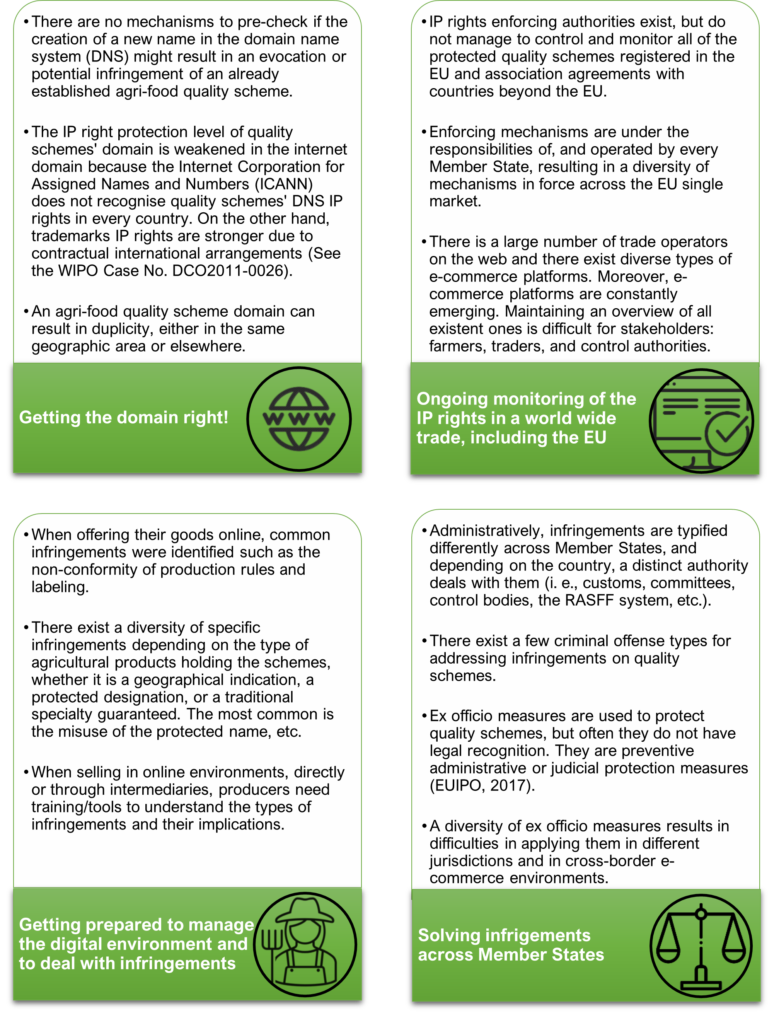
3. Can non-EU quality schemes be protected in EU e-commerce via association agreements? The case of Chilean and Georgian wine
For answering this question, we dig into two association agreements: namely Chile and Georgia. Chile is an established agricultural exporter, whereas Georgia is a newly emerging country with an interesting boutique portfolio of agricultural products. Wines holding quality schemes are the common denominator product in both countries. Both have wine boards that support strategies for the internationalisation of their wine. For the Chilean case, “Wines of Chile”[9] is a private marketing board that promotes the quality and image of Chilean wine in the world, with several branch offices in six countries, on three continents. Surprisingly, with Chile being the fourth largest worldwide exporter of wine in 2021 (ITC, 2022), its board does not actively promote Chilean wine holding quality schemes. On the other hand, Georgia possesses a marketing organization called “Wines of Georgia”[10], which dynamically advertises Georgian wines with protected designations of origin. Through maps, the web page shows the precise geographic location of the appellations of origin as well[11].
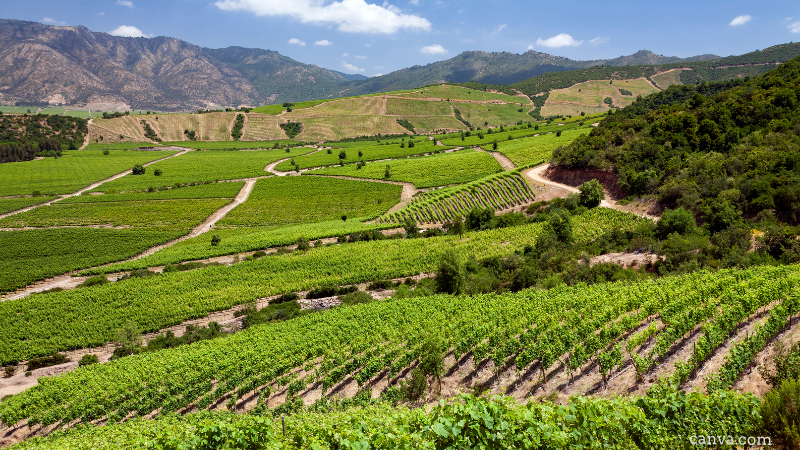
While the Chilean association agreement with the EU entered into force in 2003 (European Commission, 2022), the Georgian entered into force more than a decade later, i.e., 2016 (European Commission, 2022). Chile has submitted the recognition of wine originating from 33 different geographical areas, thus wine coming from those regions holds a category of protected GIs (European Commission, 2022). Georgia instead has mutually recognised 18 wines holding quality schemes in the frame of the association agreement with the EU (European Commission, 2022). Up to date, Georgia registered 19 appellations of origin and 19 geographical indications of different agricultural products in the EU, including wine (Sakpatenti, 2022).
What are the e-commerce clauses agreed in these association agreements? What is the level of protection of IP rights negotiated? How are those IP rights monitored in an online environment in the EU markets’ jurisdiction? How does this work in practice? To answer those questions, Table 1 presents a brief comparison of the legal dispositions that the EU has agreed upon in every respective association agreement.
To complete our desk research, we interviewed the IP rights authorities of Chile and Georgia. For the former, we interviewed the International Affairs and Policy Department of the Chilean National Institute of Industrial Property (Instituto Nacional de Propiedad Industrial – INAPI)[12]. The latter was the Georgian Intellectual Property Centre (Sakpatenti)[13].
Both authorities provided a view of the developments of the mutually recognised quality schemes and their performance on sales channels, including e-commerce platforms in the frame of intercontinental relations.
| Association Agreements negotiations | Mutually recognised quality schemes | From the wine sector | Provisions concerning IP rights | Provisions concerning e-commerce | Marketing and labelling provisions | Business sellers of cross-border nature | |
| Chile | Annex V – Appendix II
Annex VI – Appendix I – Appendix IV |
Section 6, Art. 90, Annex V, Annex VI | Art. 32
Title V, Art. 168 – Art. 170 |
Art. 104 | N/A | N/A | |
| Georgia | Sub-section 3, Art. 169 – Art. 179
Annex XVII-A Annex XVII-B Annex XVII-D, Part B |
Art. 170 | Chapter 9, Section I, Art. 150 – Art. 153
Section 3, Art. 190 – Art. 202 |
Chapter 6, Section I, Art. 76
Section 6 Art. 127 – Art. 133 |
Art. 49 | Art. 90 |
Table 1: Compilation of the similarities of Association Agreements that include a) mutually recognised quality schemes; b) provisions for IP rights; and c) e-commerce clauses
Hereafter we present our own observations after checking the legal dispositions contained in the two association agreements and interviewing the respective IP authorities.
3.1 The Chilean e-commerce legal dispositions
In the Chilean case, the signed association agreement contains a single legal disposition on e-commerce. Art. 104 promotes the development of a regulatory framework for electronic commerce between both parties, especially for gaining mutual market access. However, according to the Chilean National Institute of Industrial Property (INAPI), since the association agreement entered into force, there has been little or no progress in extending the regulatory framework into e-commerce platforms between both contracting parties. When the agreement was ratified, e-commerce was not as developed as it is today (INAPI, personal communication, May 23, 2022). Currently, the association agreement is in a renovation phase. According to INAPI, this modernisation will include future improvements for the e-commerce chapter (SUBREI, 2022). So far, INAPI does not monitor the protection of IP rights of Chilean quality schemes in the EU market on traditional sales channels (INAPI, personal communication, May 23, 2022). On the IP rights provisions, the clauses agreed between Chile and the EU are mainly based on international IP rights conventions (European Commission, 2022). Another key point is that Chilean IP rights authorities do not monitor the sales of Chilean agri-food quality schemes in other foreign markets.
3.2 The Georgian e-commerce framework
For Georgia, e-commerce provisions are a bit more comprehensive. Chapter 6, Section I, Art. 76 of the association agreement with the EU sets the foundation for establishing the basis for cooperation on e-commerce. Section 6 of the agreement include clauses dedicated to widen relevant regulatory aspects for enabling e-commerce such as cross-border e-commerce services, the liability of intermediary service providers, consumers’ protection in an e-commerce environment, business sellers of cross-border nature, and no monitoring obligations (European Commission, 2022).
Georgia had a case where a cheese protected by geographical indication was claimed to be counterfeited in Estonia[14].
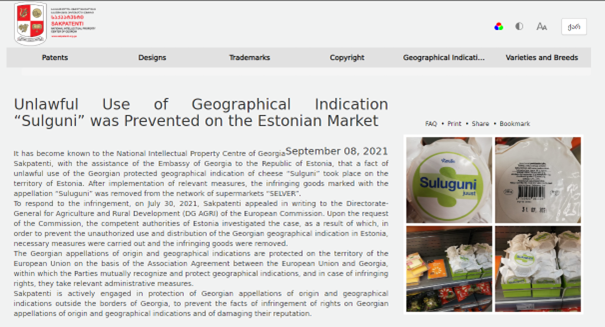
SAKPATENTI, the intellectual property center of Georgia, reacted to it immediately and based on the Art. 175 of the association agreement, both EU and Georgian IP authorities cooperated and solved the case. According to SAKPATENTI, it was possible to act on the case because there was financial support from the EU’s TWINNING Project[15], which aimed to establish an efficient protection and control system of geographical indications in Georgia. However, for future cases, SAKPATENTI officers stated: “As a small country, our government does not possess the budget to monitor major markets such as the EU, Russian Federation, or China. We do believe the private sector, private companies should also play a role in fighting against counterfeiters”, (SAKPATENTI, personal communication, June 20, 2022).
Given the trade relations between the EU and Georgia, according to SAKPATENTI, since 2017-2018 the Georgian government is working on the law’s draft on e-commerce. Corresponding changes to the Law on Copyright and Related Rights are ongoing within the “EU Georgia Intellectual Property Project (EUGIPP)”[16] (SAKPATENTI, personal communication, May 13, 2022). It is expected that this legislation will be concluded and will enter into force in 2022-2023. This new legislation should strengthen e-commerce relations with the EU and some procedures for exercising e-commerce and monitoring IP rights are going to be harmonized with EU member states’ IP authorities (SAKPATENTI, personal communication, June 20, 2022).
Furthermore, in the frame of cooperation with the TWINNING project, SAKPATENTI is being trained by ICQRF from the Italian Ministry of Agricultural, Food and Forestry Policies to create memorandum of understandings to be signed with e-commerce giants, such as Amazon, e-bay, etc. to address infringements on e-commerce in the same way Italy is implementing its own mechanisms.
Despite an e-commerce framework existing in the association agreements, so far, neither of these countries sell wine via e-commerce within the EU market directly, therefore no mechanisms for monitoring IP rights in e-commerce have been implemented. Notwithstanding, wines protected under quality schemes from Chile and Georgia are being sold in the EU market through different sales channels.
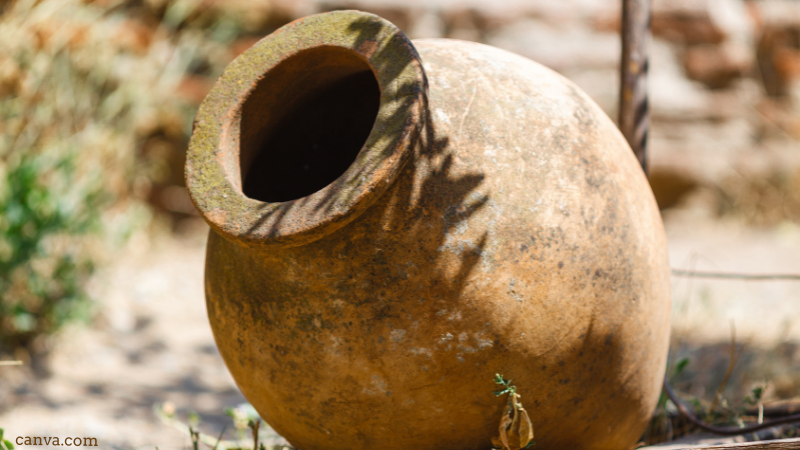
To understand these two case-studies which bring more practical perspectives on the role of association agreements and CAP, we need to draw on other regulation specifically developed for digital markets like the EU Directive No. 2000/31. Indeed, this directive was the regulatory backbone for governing e-commerce activities on the EU single market and become relevant also for the association agreements with Chile started in 2003 and with Georgia in 2016. Another element to bear in mind is that when this directive was published, internet and e-commerce were at the early stages of their current expansion. Indeed, given the rapid evolution of digital markets, since 2020, the Commission has released a proposal for a Digital Services Act (DSA).
As we have seen here, the level of protection of IP rights depends on a mix of regulatory provisions and authorities. The next section briefly discusses how the new DSA initiative can further support the development of e-commerce in the context of CAP reform post-2022 and association agreements with non-EU countries.
4. Can the EU Digital Services Act complement CAP reform and association agreements to protect quality schemes in e-commerce?
Together with the Digital Markets Act (DMA), the Digital Services Act (DSA) was introduced in 2020 to shape Europe’s digital future. One of the new DSA’s objectives is to complement the 2000 e-Commerce Directive, and the next major intention is to regulate online intermediaries, online services, and e-commerce platforms (regardless of their size) (CME, 2022).
Currently, every Member State manages different e-commerce rules. This regulation aims to reduce legal fragmentation in the EU. This would provide SMEs with a macro legal framework to allow them to grow their sales in the e-commerce environment uniformly. This improvement is significant for producer groups that deal with agri-food quality schemes digitally in the single market. For third countries’ producer groups in the SMEs category, such standardisation could incentivise intercontinental trade, especially those belonging to the global south as contracting parties of association agreements. As learned from the previous section, IP rights monitoring mechanisms are fragmented across Member States. Therefore, this sector of agri-food trade needs to look at the EU-wide due diligence obligations agreed in the DSA and their potential for ensuring more harmonised coordination mechanisms to protect quality schemes’ IP rights on a digital level for EU and foreign SMEs.
Second, the DSA reinforces the need to establish regulatory dispositions not only to detect, but also to deal with the situations of counterfeited goods traded on e-platforms. This area of jurisdictional procedure and due diligence is vital for an effective enforcement of IP rights, besides their monitoring and detection.
Another area of overlaps between DSA and the protection of quality schemes occurs at the level of regulating large e-commerce platforms across the EU, especially large ones. Moreover, the intention of the DSA is to enforce controls that are more homogeneous and apply standard measures across the Member States. This could help also to harmonise ex officio measures and administrative procedures.
Furthermore, this new legislation for a single market for digital services has been conceived in a way it complements other legislative acts of the EU, including consumer protection directives such as EU Directive No 2019/161. Let us not forget that one of the most important objectives of agri-food quality schemes is to gain credibility among consumers and communicate the territorial quality of agri-food products. The e-commerce sales channel is an automatic tool to communicate not just the quality scheme status, but also the products’ attributes.
In relation to commercialisation practices and possibilities, the new DSA foresees a mechanism for solving disputes at the B2B digital level. For this, the EU Member States agreed that for the enforcement of the DSA, it is important to improve cross-border cooperation. This might benefit B2B intercontinental relations too. Generally, all the aspects contained in the new DSA are relevant for association agreements signed between the EU and third countries.
5. Conclusions & recommendations
Among our major findings, this article highlighted that the protection of IP rights for agri-food quality schemes might be compromised by the lack of a harmonised EU-wide system for monitoring and enforcing IP rights in different online sales channels across the 27 Member States, including e-commerce platforms.
Overall, the development of IP rights enforcement systems is emerging at different speeds across the EU Member States, thus affecting the level of protection for both EU and non-EU producers. For instance, Italy is at the forefront to protect IP rights on their own products in e-commerce platforms, considering its high number of registered quality schemes in the EU, but it is unclear how Italy and other EU Member States protect non-EU quality schemes in the single market.
Therefore, even if the CAP reform post-2022 has made some progress in introducing legal provisions that extend the quality schemes’ protection in e-commerce platforms, in our analysis, these provisions need to be accompanied by EU-wide coherent mechanisms to monitor and enforce the IP rights of international products in digital contexts In this, the EU can learn from how Italy deals with its own quality scheme products.
As the CAP’s CMO reform post-2022 does not address these enforcing issues at EU wide scale, the Member States and other partner countries could still act at the level of bilateral agreements, thus revising their association agreements towards incorporating a specific chapter on the protection of IP rights in the digital economy. Chile and Georgia show that besides the CAP and other EU laws, association agreements can also include legal provisions for enabling the protection of IP rights in e-commerce platforms; however, their negotiations need to be up to date with the fast-speeding developments of digital trade and new legal frameworks that address the establishment of proper IP monitoring mechanisms.
In any case, rules are not enough for enforcing protection. This was particularly evident in the Georgian case where provisions exist, but the resources and mechanisms for monitoring and safeguarding IP rights of agri-food quality schemes were poorly defined or lacking. It is important therefore that when reviewing the Chilean, Georgian, or any other association agreements, these contain legal dispositions of the three interlinked topics: a) Geographical Indications and more broadly quality schemes, b) IP rights, and c) e-commerce provisions. These provisions could be strengthened by the establishment of minimum standards for the monitoring of IP rights in different sales channels, including e-commerce. Accordingly, the EU could revise and update association agreements already in force. Moreover, the EU could develop a new authority that exercises the governance of e-commerce of agricultural goods in general. A central authority can ease the process of dealing with the different IP authorities and the ongoing IP rights mechanisms in every Member State. For instance, either the GIVIew[17] platform or the new EU quality schemes B2B platform[18] could be relaunched, renewed, and streamlined to transmit to users the agri-food quality schemes implications when adopting e-commerce.
Based on these analyses, our recommendation invites future CAP reform to introduce more specific amendments to align the e-CMO with other EU legislations like the Digital Services Act Package, and strategies for the protection and enforcement of intellectual property rights in third countries, thus safeguarding both EU quality schemes in third countries, and conversely, third countries’ IP rights within the single market, irrespective of their recognition procedure. Moreover, we believe that public and private e-commerce platforms should also step up their efforts to harmonise rules and procedures towards a fair and protected market, for EU and non-EU actors.
Acknowledgements from the author
My personal and professional motivation to write this policy analysis is to provide other perspectives on how SMEs from the global south could better achieve the direct benefits of intercontinental trade. Thus, promoting more direct and more transparent supply chains and enabling more actors in the market. E-commerce might eliminate intermediation.
This work is dedicated to my Bulgarian daughter. In this regard, as a single mother and researcher living in Honduras, I spent eight months conducting this analysis in my free time because I strongly believe public policies make a difference in citizens’ lives. Since, in Honduras it is normal to work under the challenges of climate, infrastructure, security threats, and socio-political hardship, I do also believe that future EU policies should create a direct impact on global south citizens as well. E-commerce is an enabler.
To the stakeholders involved, I highly appreciate the trust of Chilean and Georgian IP Authorities in developing this contribution. I also thank the European Commission staff for the constant collaborative exchange in providing comprehensive clarifications and legal interpretations of these intertwined sets of policies.
Last but not least, profound thanks to my ARC colleagues for their continuous fruitful commitment.
References
CME. (2022, September 15). Our policy priorities | Digital Services Act (DSA). Retrieved from Classifieds marketplaces contribute to key EU Public Policy objectives: https://classifiedsmarketplaces.eu/positions/
EUIPO. (2017, December). PROTECTION AND CONTROL OF GEOGRAPHICAL INDICATIONS FOR AGRICULTURAL PRODUCTS IN THE EU MEMBER STATES. doi:10.2814/910533
European Commission. (2013, December). Assessing the added value of PDO/PGI products. Retrieved April 10th, 2021, from https://ec.europa.eu/info/food-farming-fisheries/key-policies/common-agricultural-policy/cmef/products-and-markets/assessing-added-value-pdo-pgi-products_en
European Commission. (2018, February 21). Report on the protection and enforcement of intellectual property rights in third countries. Retrieved from COMMISSION STAFF WORKING DOCUMENT: https://trade.ec.europa.eu/doclib/docs/2018/march/tradoc_156634.pdf
European Commission. (2019, December 11). The European Green Deal. Retrieved from EUR-Lex: https://eur-lex.europa.eu/legal-content/EN/TXT/?uri=COM%3A2019%3A640%3AFIN
European Commission. (2020, December). Evaluation support study on Geographical Indications and Traditional Specialities Guaranteed protected in the EU. Luxembourg City, Luxembourg, Luxembourg. doi:10.2762/891024
European Commission. (2021, December 20). COMMISSION STAFF WORKING DOCUMENT EVALUATION OF GEOGRAPHICAL INDICATIONS AND TRADITIONAL SPECIALITIES GUARANTEED PROTECTED IN THE EU. Retrieved from EUR – Lex: https://eur-lex.europa.eu/legal-content/EN/TXT/?uri=SWD:2021:427:FIN
European Commission. (2021, April 27). Report on the protection and enforcement of intellectual property rights in third countries. Retrieved from COMMISSION STAFF WORKING DOCUMENT: https://trade.ec.europa.eu/doclib/html/159553.htm
European Commission. (2021, December). Study on EU agri-food exports via e-commerce to China. Retrieved from Home | Food, farming, fisheries | Key policies | Common agricultural policy | CMEF | Products and markets: https://ec.europa.eu/info/food-farming-fisheries/key-policies/common-agricultural-policy/cmef/products-and-markets/study-eu-agri-food-exports-e-commerce-china_en
European Commission. (2022, May 28). Chile | EU trade relations with Chile. Facts, figures and latest developments. Retrieved from EU trade relations by country/regions | Countries and Regions | Chile: https://policy.trade.ec.europa.eu/eu-trade-relationships-country-and-region/countries-and-regions/chile_en
European Commission. (2022, May 14). Farm to Fork strategy | For a fair, healthy and environmentally-friendly food system. Retrieved from Food Safety: https://ec.europa.eu/food/horizontal-topics/farm-fork-strategy_en
European Commission. (2022, May 29). Georgia | EU trade relations with Georgia. Facts, figures and latest developments. Retrieved from EU trade relations by country/regions | Countries and Regions | Georgia: https://policy.trade.ec.europa.eu/eu-trade-relationships-country-and-region/countries-and-regions/georgia_en
European Commission. (2022, March 31). Proposal for a regulation on EU geographical indications for wine, spirit drinks and agricultural products, and quality schemes for agricultural products, amending Regulations No 1308/2013, No 2017/1001 & repealing No. 1151/2012. Retrieved from EUR-Lex: https://eur-lex.europa.eu/legal-content/EN/TXT/?uri=CELEX%3A52022PC0134
European Commission. (2022, May 22). Shaping Europe’s digital future. Retrieved from Proposal for a Regulation of the European Parliament and of the Council on a Single Market For Digital Services (Digital Services Act) and amending Directive 2000/31/EC: https://digital-strategy.ec.europa.eu/en/library/proposal-regulation-european-parliament-and-council-single-market-digital-services-digital-services
European Parliament. (2013, December 20). Regulation (EU) No 1308/2013 of the European Parliament and of the Council of 17 December 2013 establishing a common organisation of the markets in agricultural products and repealing Council Regulations (EEC) No 922/72, (EEC) No 234/79, (EC) No 1037/2001. Retrieved from EUR-Lex: https://eur-lex.europa.eu/legal-content/EN/TXT/?uri=CELEX%3A32013R1308
European Parliament. (2021, December 07). Consolidated text: Regulation (EU) No 1308/2013 of the European Parliament and of the Council of 17 December 2013 establishing a common organisation of the markets in agricultural products and repealing Council Regulations (EEC) No 922/72, (EEC) No 234/79. Retrieved from EUR-Lex: https://eur-lex.europa.eu/legal-content/EN/TXT/?uri=CELEX%3A02013R1308-20211207
France AgriMer. (2020). Etude sur la commercialisation du vin par internet. Retrieved from Établissement national des produits de l’agriculture et de la mer (FranceAgriMer): https://www.franceagrimer.fr/Actualite/Filieres/Vin-et-cidriculture/Vin/2020/Etude-sur-la-commercialisation-du-vin-par-internet
ICQRF. (2020). ICQRF – Ispettorato centrale della tutela della qualità e della repressione frodi dei prodotti agroalimentari. Retrieved from Ministero delle politiche agricole alimentari e forestali: https://www.politicheagricole.it/flex/cm/pages/ServeBLOB.php/L/IT/IDPagina/394
ITC. (2022, May 1st). Wine Exports | HS 2204. Retrieved from Trade Map: https://www.trademap.org/Index.aspx
Sakpatenti. (2022, June 10). Georgian Indications protected abroad. Retrieved from Intellectual Property Centre of Georgia: https://www.sakpatenti.gov.ge/en/page/113/
SUBREI. (2022, June 10). MODERNIZACIÓN ACUERDO DE ASOCIACIÓN CHILE – UNIÓN EUROPEA. Retrieved from Subsecretaría de Relaciones Económicas Internacionales | Acuerdos Comerciales | Ejes de trabajo : https://www.subrei.gob.cl/acuerdos-comerciales/modernizacion-ue-chile
The Business Research Company. (2022, August 05). Food And Beverages E-Commerce Global Market Report 2022 – By Product (Video Products, Audio Products), By Business Model (Business To Business (B2B), Business To Consumer (B2C)), By Pricing Model (Low Cost Products, Medium Cost Products, High End Products. Retrieved from The Business Research Company: https://www.thebusinessresearchcompany.com/report/food-and-beverages-ecommerce-global-market-report
WHO. (2021, ). Digital food environments: factsheet. Retrieved from WHO – International Repository for Information Sharing: https://apps.who.int/iris/handle/10665/342072
WIPO. (2019, February 25). Compilation of the replies to questionnaire II on the use/misuse of geographical indications, country names and geographical terms on the Internet and in the DNS. Retrieved from Standing Committee on the Law of Trademarks, Industrial Designs and Geographical Indications: https://www.wipo.int/meetings/en/doc_details.jsp?doc_id=429458
To understand how the EU Commission evaluates the quality schemes and what is at stake for the protection of IP rights, we consulted the following studies:
-
(2018) “Protection and control of Geographical Indications for agricultural products in the EU Member States”[19]
-
(2019) “Compilation of the replies to questionnaire II, on the use/misuse of geographical indications, country names, and geographical terms on the internet and in the DNS”[20];
-
(2021) “Evaluation support study on Geographical Indications, Protected Designations of Origin, and Traditional Specialities Guaranteed protected in the EU”[21];
-
(2021) “Commission staff working document evaluation of Geographical Indications and Traditional Specialities Guaranteed protected in the EU”[22]
[1] See the Mexican Tequila direct registration case: https://www.tmdn.org/giview/gi/EUGI00000016163
[2] https://euipo.europa.eu/ohimportal/en/web/guest/home
[3] https://europa.eu/more-than-food-uae/european-quality-schemes
[4] https://agriculture.ec.europa.eu/farming/geographical-indications-and-quality-schemes_en
[5] https://www.thebusinessresearchcompany.com/report/food-and-beverages-ecommerce-global-market-report
[6] Ex officio measures are preventive administrative or judicial protection measures conceived at the member state authority level. They are created by every member state since the EU regulations do not include specific sanction or regulation procedures, at the neither national nor international level (EUIPO, 2017)
[7] https://www.politicheagricole.it/flex/cm/pages/ServeBLOB.php/L/IT/IDPagina/394
[8] https://www.politicheagricole.it
[9] https://www.winesofchile.org/en
[10] https://winesgeorgia.com/
[11] https://winesgeorgia.com/appellations/
[12] https://www.inapi.cl/
[13] https://www.sakpatenti.gov.ge/ka/
[14] https://www.sakpatenti.gov.ge/en/news_and_events/380/
[15] http://twinning.sakpatenti.org.ge/en/page/2/
[16] https://internationalipcooperation.eu/en/eugipp/about-eugipp
[17] https://www.tmdn.org/giview/
[18] https://europa.eu/more-than-food-uae/european-quality-schemes
[19] https://op.europa.eu/en/publication-detail/-/publication/0c120946-6eb3-11e8-9483-01aa75ed71a1
[20] https://www.wipo.int/meetings/en/doc_details.jsp?doc_id=429458
[21] https://op.europa.eu/en/publication-detail/-/publication/c1d86ba1-7b09-11eb-9ac9-01aa75ed71a1/language-en
[22] https://eur-lex.europa.eu/legal-content/EN/TXT/?uri=SWD:2021:427:FIN
Download this article as a PDF
 This article is produced in cooperation with the
This article is produced in cooperation with the
Heinrich Böll Stiftung European Union.
More on CAP Strategic Plans
Can the CAP Strategic Plans Help in Reaching our Pesticide Reduction Goals?
Wallonia’s Observation Letter: A plan that fails to address climate and biodiversity crises
CAP Strategic Plans and Food Security: Fallow Lands, Feeds, and Transitioning the Livestock Industry
A Just and Green CAP and Trade Policy in and Beyond the EU – Part 2
A Just and Green CAP and Trade Policy in and Beyond the EU: Part 1
Bulgaria’s CAP Strategic Plan: Backsliding on Nature and Biodiversity
Changes “required” to Ireland’s CAP Strategic Plan – European Commission
French CAP Plan: What Opportunities for Change During the New 2022-27 Presidential Term?
CAP, Fairness and the Merits of a Unique Beneficiary Code – Matteo Metta on Ireland’s Draft Plan
ARC Launches New Report on CAP as Member States Submit Strategic Plans
Slashing Space for Nature? Ireland Backsliding on CAP basics
Quality Schemes – Who Benefits? Central America, Coffee and the EU
Civil Society Organisations Demand Open and Ambitious Approval of CAP Plans
CAP Strategic Plans: Germany Taking Steps in the Right Direction?
CAP Strategic Plans: Support to High-Nature-Value Farming in Bulgaria
Commission’s Recommendations to CAP Strategic Plans: Glitters or Gold?
German Environment Ministry Proposals For CAP Green Architecture
CAP Performance Monitoring and Evaluation Framework – EP Position
A Rural Proofed CAP post 2020? – Analysis of the European Parliament’s Position
CAP Beyond the EU: The Case of Honduran Banana Supply Chains
CAP | Parliament’s Political Groups Make Moves as Committee System Breaks Down
CAP & the Global South: National Strategic Plans – a Step Backwards?
CAP Strategic Plans on Climate, Environment – Ever Decreasing Circles
European Green Deal | Revving Up For CAP Reform, Or More Hot Air?
Climate and environmentally ambitious CAP Strategic Plans: Based on what exactly?
How Transparent and Inclusive is the Design Process of the National CAP Strategic Plans?





